Easter Sunday
The Resurrection of the Lord
April 5, 2015 Cycle B
White priestly vestments symbolize purity and integrity of the
life of faith.
Home Page
Liturgical
Church Year Cycle B14-15
Introductory Acts Of Worship
The Entrance Prayers:
On Sunday, usually a hymn praising God
is sung in place of reciting a Psalm from the Bible which invites us to
enter more deeply into the mystery of God's love for us. The recited
weekday Psalm expresses a youthful heart and spirit, delighted that we may come
before the living God.
Entrance Song
/ Entrance Psalm (Antiphon)
Entrance Song
Psalm 139:18, 5-6 I
have risen, and I am with you still, alleluia.
You have laid your hand upon me, alleluia. Too wonderful for me, this
knowledge, alleluia, alleluia.
The Priest Approaches and Kisses the Altar:
The
altar is a symbol of Christ. In it are cut five crosses to recall the five
wounds of Christ. The altar also represents the Church and has embedded in
it the relics of her saints. The priest comes to the altar to celebrate
the Sacrifice in the Church's name. Because of the glory surrounding the
altar upon which the divine Sacrifice will be made, the kiss of the priest
unites the Church to Christ, its Redeemer.
Priest:
In the name of the Father, and of the Son, and of the Holy Spirit.
All:
Amen.
The Greeting:
We are welcomed in God's name. Our
response unites us to our neighbor, to the priest and to God. (The priest
may select from several forms of greeting).
Priest: The
grace of our Lord Jesus Christ, and the love of God, and the communion of the
Holy Spirit be with you all.
All:
And with your spirit.
The Penitential Prayers:
We recognize our guilt for past sins,
express our sorrow for them, and ask that Mary, the angels, the saints, and our
brothers and sisters in Christ pray for the Lord God's mercy. (The priest
may select from several forms).
Priest: Brothers and sisters, let
us acknowledge our sins, and so prepare ourselves to celebrate the sacred
mysteries.
Priest Have mercy on us, O Lord.
All: For we have sinned against you.
Priest: Show us, O Lord, your mercy.
All: And grant us your salvation.
The Absolution:
Priest: May almighty God have
mercy on us, forgive us our sins, and bring us to everlasting life.
All:
Amen.
The Gloria:
The Glory of God prayers have existed from
the second century. They repeat the angels praise of God which heralded
the birth of Christ on earth. Our praise is lifted again through the years
as we rejoice at His coming as Lord, God, the most high Jesus Christ, who at
Christmas took on our human nature while at the same time being the son of Man.
This ancient hymn expresses our recognition of God's glory and love. It
calls upon Christ as our holy and divine mediator, and the Holy Spirit who
forever binds us together in God's love.
Priest and All:
Glory to God in the highest, and peace to his people
on earth. Lord God, heavenly King, almighty God and Father, we worship
you, we give you thinks, we praise you for your glory. Lord Jesus Christ,
only son of the Father, Lord God, Lamb of God, you take away the sins of the
world: have mercy on us; you are seated at the right hand of the Father: receive
our prayer. For you alone are the Holy One, you alone are the Lord, you
alone are the Most High, Jesus Christ, with the Holy Spirit, in the glory of God
the Father. Amen.
The Collect:
The
priest lifts the united prayers and petitions of the congregation to God the
Father through the merits of Jesus Christ in the Holy Spirit.
Priest: Let us pray.
Priest: O God, who on this day, through your Only Begotten
Son, have conquered death and unlocked for us the path to eternity, grant, we
pray that we who keep the solemnity of the Lord's Resurrection may, through the
renewal brought by your Spirit, rise up in the light of life. Through our
Lord Jesus Christ, your Son, who lives and reigns with you in the unity of the
Holy Spirit, one God, for ever and ever.
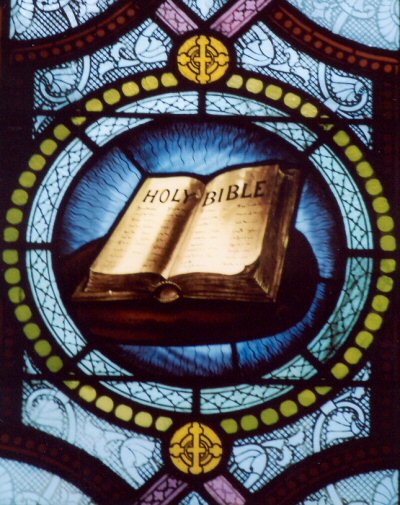
Liturgy of the Word
Christ is made known to us through the
Old Testament which prepares us to recognize Him. In those days, God
inspired men who spoke His message. Now, the New Testament Gospel reading
announces His presence to us directly through His Son. Both
readings bring God's message to us. Our responsibility is to respond.
The First Reading:
From the Old Testament
Priest/Reader: A reading from the
Acts of the Apostles.
First Reading: Acts 10:34a, 37-43
Peter proceeded to speak
and said: “You know what has happened all over Judea, beginning in Galilee after
the baptism that John preached, how God anointed Jesus of Nazareth with the Holy
Spirit and power. He went about doing good and healing all those oppressed by
the devil, for God was with him. We are witnesses of all that he did both in
the country of the Jews and in Jerusalem. They put him to death by hanging him
on a tree. This man God raised on the third day and granted that he be visible,
not to all the people, but to us, the witnesses chosen by God in advance, who
ate and drank with him after he rose from the dead. He commissioned us to
preach to the people and testify that he is the one appointed by God as judge of
the living and the dead. To him all the prophets bear witness, that everyone
who believes in him will receive forgiveness of sins through his name.”
Priest/Reader:
The Word of the
Lord.
All:
Thanks
be to God.
The Responsorial Psalm:
This Psalm praising God, is a prayer to God,
or recommends the practice of virtue. It is sung as an interlude between
the scriptural readings. It provides yet another instructional setting and
invites the assembly to imitate the cantor who sings a repeated response to the
verses of an ancient Psalm many of which are attributed to King David. The
verses are sung first by a cantor (song leader) accompanied by instruments, the
refrain is sung by the people.
Responsorial
Psalm 118:1-2, 16-17, 22-23
Cantor: This is the day the Lord
has made; let us rejoice and be glad.
All: R/. This
is the day the Lord has made; let us rejoice and be glad.
Cantor: Give thanks to the Lord, for his is good, for his
mercy endures forever. Let the house of Israel say, “His mercy endures
forever.”
All: R/. This
is the day the Lord has made; let us rejoice and be glad.
Cantor: “The right hand of the Lord has struck with power;
the right hand of the Lord is exalted. I shall not die, but live, and declare
the works of the Lord.”
All: R/. This
is the day the Lord has made; let us rejoice and be glad.
Cantor: The stone which the builders rejected has become the
cornerstone. By the Lord has this been done; it is wonderful in our eyes.
All: R/. This
is the day the Lord has made; let us rejoice and be glad.
The Second Reading:
Taken from the New Testament, often
from a letter written by St. Paul.
Colossians 3:1-4
Brothers and sisters: if
then you were raised with Christ, seek what is above, where Christ is seated at
the right hand of God. Think of what is above, not of what is on earth. For
you have died, and your life is hidden with Christ in God. When Christ your
life appears, then you too will appear with him in glory.
The Sequence: A hymn of joy
said or sung before the Gospel on certain feast days.
Victimae paschal laudes
Christians, to the Paschal
Victim offer your thankful praises!
A Lamb the sheep redeems; Christ, who only is sinless, reconciles sinners
to the Father.
Death and life have contended in that combat stupendous: the Prince of
life, who died, reigns immortal.
Speak, Mary, declaring what you saw, wayfaring.
“The tomb of Christ, who is living, the glory of Jesus’ resurrection;
bright angels attesting, the shroud and napkin resting.
Yes, Christ my hope is arisen; to Galilee he goes before you.”
Christ indeed from death is risen, our new life obtaining.
Have mercy, victor King, ever reigning!
Amen. Alleluia.
The Alleluia:
An ancient expression of joy anticipating
the Lord's message we will hear in the Gospel.
1 Corinthians 5:7b-8a
Cantor: Alleluia!
Alleluia! Alleluia!
ALL: R/. Alleluia! Alleluia! Alleluia!
Cantor: Christ, our paschal lamb, as been sacrificed; let
us then feast with joy in the Lord.
ALL: R/. Alleluia! Alleluia! Alleluia!
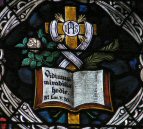 The Gospel:
The Liturgy of the Word is completed
by the reading of the Gospel. Before its reading, the members of the
assembly trace the sign of the cross upon the forehead to indicate their mental
acceptance of the Truth, on the lips to indicate their readiness to announce it,
and over the heart to indicate their sincere desire to accept it into their
lives. The "Good News" of the Gospel tells that God's kingdom has come for
all to hear, accept, and announce to the world for its salvation. It
is God who is speaking to us. Christ comes to teach us by the example of
His life and by His own words.
The Gospel:
The Liturgy of the Word is completed
by the reading of the Gospel. Before its reading, the members of the
assembly trace the sign of the cross upon the forehead to indicate their mental
acceptance of the Truth, on the lips to indicate their readiness to announce it,
and over the heart to indicate their sincere desire to accept it into their
lives. The "Good News" of the Gospel tells that God's kingdom has come for
all to hear, accept, and announce to the world for its salvation. It
is God who is speaking to us. Christ comes to teach us by the example of
His life and by His own words.
Priest: Cleanse my heart and my lips, almighty God, that I may worthily proclaim your
holy Gospel. Through the words of the Gospel may our sins be wiped away.
Priest: The Lord be with you.
All: And with our spirit.
Priest/Deacon: A
reading from the holy Gospel according
to John.
All: Glory
to you, Lord.
The Gospel: John
20:1-9
John wrote to show that Christ was
the Messiah, the Divine Son of God.
 On
the first day of the week, Mary of Magdala came to the tomb early in the
morning, while it was still dark, and saw the stone removed from the tomb. So
she ran and went to Simon Peter and to the other disciple whom Jesus loved, and
told them, “They have taken the Lord from the tomb, and we don’t know where they
put him.” So Peter and the other disciple went out and came to the tomb. They
both ran, but the other disciple ran faster than Peter and arrived at the tomb
first; he bent down and saw the burial cloths there, but did not go in. When
Simon Peter arrived after him, he went into the tomb and saw the burial cloths
there, and the cloth that had covered his head, not with the burial cloths but
rolled up in a separate place. Then the other disciple also went in, the one
who had arrived at the tomb first, and saw and believed. For they did not yet
understand the Scripture that he had to rise from the dead.
On
the first day of the week, Mary of Magdala came to the tomb early in the
morning, while it was still dark, and saw the stone removed from the tomb. So
she ran and went to Simon Peter and to the other disciple whom Jesus loved, and
told them, “They have taken the Lord from the tomb, and we don’t know where they
put him.” So Peter and the other disciple went out and came to the tomb. They
both ran, but the other disciple ran faster than Peter and arrived at the tomb
first; he bent down and saw the burial cloths there, but did not go in. When
Simon Peter arrived after him, he went into the tomb and saw the burial cloths
there, and the cloth that had covered his head, not with the burial cloths but
rolled up in a separate place. Then the other disciple also went in, the one
who had arrived at the tomb first, and saw and believed. For they did not yet
understand the Scripture that he had to rise from the dead.
Priest/Deacon: The Gospel of the Lord.
All: Praise
to you, Lord Jesus Christ.
Priest: Through the words of the Gospel may our sins be wiped
away.
The Priest's Sermon:
The priest develops, explains, and comments upon the Master's words,
so our minds may be
enlightened, and our
hearts enriched.
(A priestly reflection upon this Gospel)
Renewal of Baptismal Promises
Priest: Dear friends, through the paschal mystery we have been buried
with Christ in baptism, so that we may rise with him to a new life. Now
that we have completed our Lenten observance, let us renew the promises we made
in baptism when we rejected Satan and his works, and promised to serve God
faithfully in his holy Catholic Church. And so:
Priest: Do you reject sin, so as to live in the freedom of God's
children?
All: I do.
Priest: Do you reject the glamour of evil, and refuse to be mastered
by sin?
All: I do.
Priest: Do you reject Satan, father of sin and prince of darkness?
All: I do.
Priest: Do you believe in God, the Father almighty, creator of heaven
and earth?
All: I do.
Priest: Do you believe in Jesus Christ, his only Son, our Lord, who was
born of the Virgin Mary, was crucified, died, and was buried, rose from the
dead, and is now seated at the right hand of the Father?
All: I do.
Priest: Do you believe in the Holy Spirit, the holy Catholic
Church, the communion of saints, the forgiveness of sins, the resurrection of
the body, and life everlasting?
All: I do.
Priest: God, the all-powerful Father of our Lord Jesus Christ, has
given us a new birth by water and the Holy Spirit, and forgiven all our sins.
May he also keep us faithful to our Lord Jesus Christ for ever and ever.
All: Amen.
General Intercessions:
We pray for the needs of the pope, civic
leaders, our own needs, those of others,
the sick, the dying, those who have died, the church, and the world.
The response of all to each intercession: Lord, hear our prayer.
All: Lord,
hear our prayer.
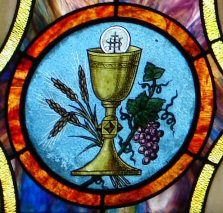 The Liturgy of the Eucharist
The Liturgy of the Eucharist
Gifts of bread and wine
symbolizing ourselves are presented to the priest who will offer them to God the
Father. Through the Holy Spirit, they will become the Body and Blood of
Jesus Christ whom we receive in Holy Communion. Jesus unites Himself with
us for our spiritual nourishment and strength. Today, when individuals do
not present their own personal offerings of bread and wine, the monetary contribution
symbolizes the material of their united sacrifice. The priest makes and
offering of the bread and wine to God.
Preparation of the Bread and
Wine:
Priest: Blessed are you, Lord God of all creation,
for through your goodness we have received the bread we offer you:
fruit of the earth and work of human hands, it will become for us the bread of
life.
All:
Blessed be God for ever.
Priest: By
the mystery of this water and wine may we come to share in the divinity of
Christ, who humbled himself to
share
in our humanity.
Priest: Blessed are you, Lord God of all creation, for through your goodness we have
received the wine we offer you; fruit
of the vine and work of human hands it will become our spiritual drink.
All: Blessed be God for ever.
Priest: With
humble spirit and contrite heart may we be accepted by you, O Lord, and may our
sacrifice in your sight this
day be pleasing to you, Lord God.
The Priest's Hands are Washed: This
act was traditionally necessary because the priest handled the various gifts
presented by the people. Now, the cleansing act using water reminds the
priest and ourselves of the need to cleanse not only the hands but the soul.
Soon, the priest's hands will hold the actual body of Christ, and we will become
His dwelling place.
Priest: Wash
me o Lord, from m iniquity and cleanse me from my sin.
Pray, brethren, that
my sacrifice and yours may be acceptable to God, the almighty Father.
All: May the Lord accept the sacrifice at your hands for the praise and glory of his
name, for our good and the good of all his holy Church.
Prayer over the Gifts:
Speaking in our name, the priest asks
the Father to accept the gifts we offer through him.
Priest: Exultant
with paschal gladness, O Lord, we offer the sacrifice by which your church is
wondrously reborn and nourished. Through Christ our Lord.
Eucharistic Prayer:
(Number Two: The priest may select from several forms).
Priest: The Lord be with you.
All: And with your
spirit.
Priest: Lift up your hearts.
All: We lift them up to the Lord.
Priest: Let us give thanks to the Lord, our God.
All: It is right
and just.
Preface Prayer:
Priest: It is truly right and just, our duty and our
salvation, at all times to acclaim you, O Lord, but on this day above all to
laud you yet more gloriously, when Christ our Passover has been sacrificed.
For he is the true Lamb who has taken away the sins of the world; by dying he
has destroyed our death, and by rising, restored our life. Therefore,
overcome with paschal joy, every land, every people exults in your praise and
even the heavenly Powers, with the angelic hosts, sing together the unending
hymn of your glory, as they acclaim:
Acclamation:
Priest
and All:
Holy, Holy, Holy Lord, God of hosts. Heaven and
earth are full of your glory. Hosanna in the highest.
Blessed
is he who comes
in the name of the Lord. Hosanna in the highest.
Priest: You are indeed Holy, O Lord, the fountain of all
holiness. Make holy, therefore, these gifts, we pray, by sending down your
Spirit upon them like the dewfall, so that they may become for us the Body and
Blood of our Lord Jesus Christ.
The priest repeats the words which
Christ used at his Last Supper when He changed the bread into His Body and the
wine into His Blood. His Body and Blood are truly present but under the
appearance of bread and wine. The death of Christ is prolonged in each of
those who receive Him worthily. We apply His death to ourselves so that we
may share His glory. This moment is the most solemn on earth because it is
Divine act which enables us to apply to ourselves the Cross which Christ
willingly took upon Himself.
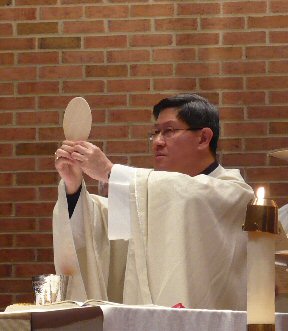 We are called to die to sin and
lift our very selves to God so that we become changed; to do as God would have
us do, to become what God would have us become. Our own little cross can
lift us into union with Christ's Cross so we may earn the joys of everlasting
happiness with God the Father.
We are called to die to sin and
lift our very selves to God so that we become changed; to do as God would have
us do, to become what God would have us become. Our own little cross can
lift us into union with Christ's Cross so we may earn the joys of everlasting
happiness with God the Father.
The
Lord's Supper:
At the time he was betrayed and entered
willingly into his Passion, he took bread and, giving thanks, broke it, and gave
it to his disciples, saying:
Take this, all of you, and eat of it, for this is my Body, which will be given
up for you.
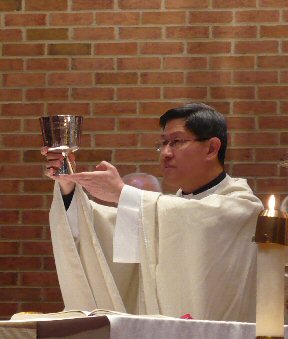 In
a similar way, when supper was ended, he took the chalice and, once more giving
thanks, he gave it to his disciples, saying:
In
a similar way, when supper was ended, he took the chalice and, once more giving
thanks, he gave it to his disciples, saying:
Take this, all of you, and
drink from it, for this is the chalice of my Blood, the Blood of the new and
eternal covenant, which will be poured out for you and for many for the
forgiveness of sins. Do this in memory of me.
Memorial Acclamation: (The priest may
select from several forms).
Priest: The
mystery of faith.
Priest
/ All: When we
eat this Bread and drink this Cup, we proclaim your Death, O Lord, until you
come again.
Memorial Prayer: (The
priest may select from several forms).
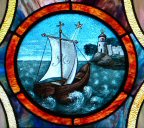 Priest:
Priest:
Recalls Christ's Passion, Resurrection, Ascension, the Church,
the dead, and ourselves.
Therefore, O Lord, as we celebrate the memorial of his Death and
Resurrection, we offer you, Lord, the Bread of life and the Chalice of
salvation, giving thanks that you have held us worthy to be in your presence and
minister to you. Humbly we pray that, partaking of the Body and Blood of
Christ, we may be gathered into one by the Holy Spirit.
Remember, your Church, spread throughout the
world, and bring her to the fullness of charity, together with _____ our Pope,
and _____ our Bishop, and all the clergy. Remember also our brothers and
sisters who have fallen asleep in the hope of the resurrection, and all who have
died in your mercy: welcome them into the light of your face. Have mercy
on us all, we pray, that with the Blessed Virgin Mary, Mother of God, with the
blessed Apostles, and all the Saints who have pleased you throughout the ages,
we may merit to be coheirs to eternal life, and may praise and glorify you
through your Son, Jesus Christ.
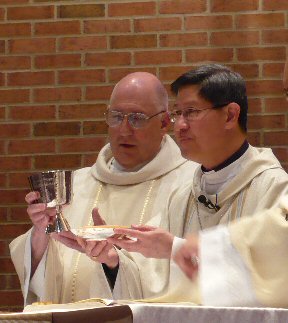 Prayer of Praise:
Through
him, with him, and in him, O God, almighty Father, in the unity of the Holy
Spirit, all glory and honor is yours, for ever and ever.
Prayer of Praise:
Through
him, with him, and in him, O God, almighty Father, in the unity of the Holy
Spirit, all glory and honor is yours, for ever and ever.
All: Amen.
Communion Rite
In the Liturgy of the Eucharist, we
symbolically offer ourselves to the Lord through the gifts of bread and wine.
At the Consecration, we offer our very lives to be united the God the Father
through the Cross of Christ. In Communion, we find that we have not died
at all, but have come to life. We have surrendered ourselves to God
through His Divine Son, Jesus Christ. In return become ennobled and
enriched. We give up time and we get eternity, we give up our sin and we
receive grace, we surrender our self-will and receive the strength of the Divine
Will, we give up ourselves and we receive everything. For the Son of God
says to us that unless we receive Him we shall not have Divine life in us.
But it is not really we who receive Christ as it is Christ who receives us,
bringing us into Himself.
God makes His Cross the very means
of our salvation and our life. While we have crucified Him, His eternal
love cannot be extinguished. Christ willed to give us the very life we
crucified in our Redemption, the Consecration of Holy Thursday into Communion,
His death into our everlasting life.
The Lord's
Prayer:
Priest: At
the Savior's command and formed by divine teaching, we dare to say:
Priest and
All: Our
Father, who art in heaven, hallowed be they name; Thy kingdom come; Thy will be
done on earth as it is in
heaven. Give us this
day our daily bread, and forgive us our trespasses, as we forgive those who
trespass against us; and lead us not into temptation, but deliver us from evil.
Priest: Deliver us, Lord, we pray, from every evil, graciously
grant peace in our days, that, by the help of your mercy, we may be always free
from sin and safe from all distress, as we await the blessed hope and the coming
of our Savior, Jesus Christ.
All: For the
kingdom, the power and the glory are yours now and forever.
Prayer for
Peace:
Priest: Lord Jesus Christ, who said to your Apostles: Peace I leave
you, my peace I give you, look not on our sins, but on the faith of your Church,
and graciously grant her peace and unity in accordance with your will. Who
live and reign for ever and ever.
All: Amen.
Priest: The peace of the Lord be with
you always.
All: And with your spirit.
Priest: Let us offer each other the sign of peace.
Breaking of the Bread:
Priest: May this mingling of the Body and Blood of our Lord
Jesus Christ bring eternal life to us who receive it.
Priest and All: Lamb of God, you take away the sins of the world,
have mercy on us.
Lamb of God, you take away the sins of the world, have mercy on us.
Lamb of God, you take away the sins of the world, grant us peace.
Priest Preparation: May the receiving of your Body and
Blood, Lord Jesus Christ, not bring me to judgment and condemnation, but through
your loving mercy be for me protection in mind and body and a healing remedy.
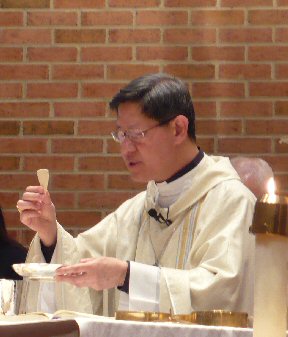 Priest: Behold
the Lamb of God, behold him who takes away the sins of the world. Blessed
are those called to the supper of the Lamb.
Priest: Behold
the Lamb of God, behold him who takes away the sins of the world. Blessed
are those called to the supper of the Lamb.
Priest and All: Lord,
I am not worthy that you should enter under my roof, but only say the world and
my soul shall be healed.
Priest: May the Body of Christ keep me safe for eternal life.
May the Blood of Christ keep me safe for eternal life.
Communion Antiphon:
1 Corinthians 5:7-8 Christ
our Passover has been sacrificed, alleluia; therefore let us keep the feast with
the unleavened bread of purity and truth, alleluia, alleluia.
Communion of the Faithful:
Priest: The Body of Christ.
The Faithful: Amen.
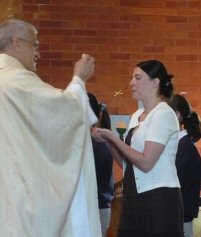
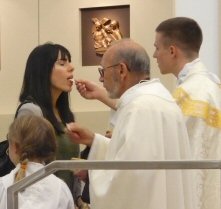
Priest/Deacon/
Extraordinary Eucharistic Minister:
The Blood of Christ.
The Faithful: Amen.
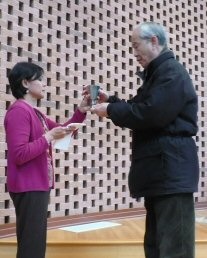
Cleansing of the Vessels:
Priest: What has passed our lips as food, O Lord, may we
possess in purity of heart, that what has been given to us in time may be our
healing for eternity.
Prayer after Communion:
Priest: Let us pray.
Priest: Look
upon your Church, O God, with unfailing love and favor, so that, renewed by the
paschal mysteries, she may come to the glory of the resurrection. Through
Christ our Lord.
Concluding Rite
Priest: The Lord be with you.
All: And
with your spirit.
Priest: Bow
down for the blessing.
Dismissal Prayer: (The priest may select
from several forms)
Priest: May almighty God bless you through today's Easter
solemnity and, in his compassion, defend you from every assault of sin.
All: Amen.
Priest: And may he, who restores you to eternal life in the
resurrection of his Only Begotten, endow you with the prize of immortality.
All: Amen.
Priest: Now that the days of the Lord's Passion have drawn to a
close, may you who celebrate the gladness of the Paschal Feast come with
Christ's help, and exulting in spirit, to those feasts that are celebrated in
eternal joy.
All: Amen.
Priest: And may the blessing of almighty God, the Father, and
the son, and the Holy Spirit, come down on you and remain with you for ever.
All: Amen.
Priest: Go in peace, alleluia, alleluia.
All: Thanks be to God,
alleluia, alleluia.
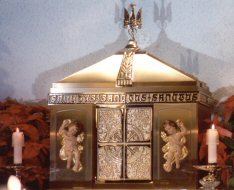 O my Jesus, forgive us our sins.
O my Jesus, forgive us our sins.
Save us from the fires of hell.
Lead all souls to heaven,
especially those in most need of your mercy.
www.Divinemasterplanforlife.com
www.Saintsnheaven.com
Top
Home Page
Liturgical
Church Year Cycle B14-15

 The Gospel:
The Liturgy of the Word is completed
by the reading of the Gospel. Before its reading, the members of the
assembly trace the sign of the cross upon the forehead to indicate their mental
acceptance of the Truth, on the lips to indicate their readiness to announce it,
and over the heart to indicate their sincere desire to accept it into their
lives. The "Good News" of the Gospel tells that God's kingdom has come for
all to hear, accept, and announce to the world for its salvation. It
is God who is speaking to us. Christ comes to teach us by the example of
His life and by His own words.
The Gospel:
The Liturgy of the Word is completed
by the reading of the Gospel. Before its reading, the members of the
assembly trace the sign of the cross upon the forehead to indicate their mental
acceptance of the Truth, on the lips to indicate their readiness to announce it,
and over the heart to indicate their sincere desire to accept it into their
lives. The "Good News" of the Gospel tells that God's kingdom has come for
all to hear, accept, and announce to the world for its salvation. It
is God who is speaking to us. Christ comes to teach us by the example of
His life and by His own words. On
the first day of the week, Mary of Magdala came to the tomb early in the
morning, while it was still dark, and saw the stone removed from the tomb. So
she ran and went to Simon Peter and to the other disciple whom Jesus loved, and
told them, “They have taken the Lord from the tomb, and we don’t know where they
put him.” So Peter and the other disciple went out and came to the tomb. They
both ran, but the other disciple ran faster than Peter and arrived at the tomb
first; he bent down and saw the burial cloths there, but did not go in. When
Simon Peter arrived after him, he went into the tomb and saw the burial cloths
there, and the cloth that had covered his head, not with the burial cloths but
rolled up in a separate place. Then the other disciple also went in, the one
who had arrived at the tomb first, and saw and believed. For they did not yet
understand the Scripture that he had to rise from the dead.
On
the first day of the week, Mary of Magdala came to the tomb early in the
morning, while it was still dark, and saw the stone removed from the tomb. So
she ran and went to Simon Peter and to the other disciple whom Jesus loved, and
told them, “They have taken the Lord from the tomb, and we don’t know where they
put him.” So Peter and the other disciple went out and came to the tomb. They
both ran, but the other disciple ran faster than Peter and arrived at the tomb
first; he bent down and saw the burial cloths there, but did not go in. When
Simon Peter arrived after him, he went into the tomb and saw the burial cloths
there, and the cloth that had covered his head, not with the burial cloths but
rolled up in a separate place. Then the other disciple also went in, the one
who had arrived at the tomb first, and saw and believed. For they did not yet
understand the Scripture that he had to rise from the dead. The Liturgy of the Eucharist
The Liturgy of the Eucharist We are called to die to sin and
lift our very selves to God so that we become changed; to do as God would have
us do, to become what God would have us become. Our own little cross can
lift us into union with Christ's Cross so we may earn the joys of everlasting
happiness with God the Father.
We are called to die to sin and
lift our very selves to God so that we become changed; to do as God would have
us do, to become what God would have us become. Our own little cross can
lift us into union with Christ's Cross so we may earn the joys of everlasting
happiness with God the Father.
 In
a similar way, when supper was ended, he took the chalice and, once more giving
thanks, he gave it to his disciples, saying:
In
a similar way, when supper was ended, he took the chalice and, once more giving
thanks, he gave it to his disciples, saying: Priest:
Priest:  Prayer of Praise:
Through
him, with him, and in him, O God, almighty Father, in the unity of the Holy
Spirit, all glory and honor is yours, for ever and ever.
Prayer of Praise:
Through
him, with him, and in him, O God, almighty Father, in the unity of the Holy
Spirit, all glory and honor is yours, for ever and ever. Priest: Behold
the Lamb of God, behold him who takes away the sins of the world. Blessed
are those called to the supper of the Lamb.
Priest: Behold
the Lamb of God, behold him who takes away the sins of the world. Blessed
are those called to the supper of the Lamb. 


 O my Jesus, forgive us our sins.
O my Jesus, forgive us our sins.